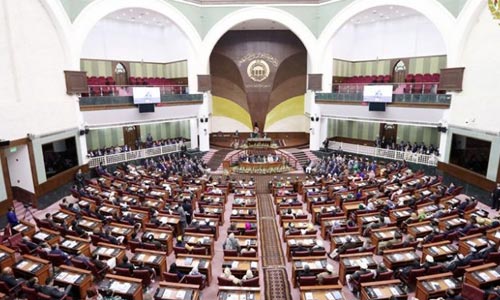The parliament of Afghanistan (Wolsi Gerga) has begun its winter vacation after eighth working years and many of the parliament members went on vacation to follow their personal business. During these eight years, the parliament has faced lots of ups and downs which are worth of study to be a lesson for the next term of it. The members of parliament were repeatedly blamed for being involved in lawlessness, corruption, racism and nonattendance to the formal parliament sessions. They went on winter vacation but during these eight years of summer or winter vacation, they have rarely visited their clients to become aware of their conditions that are located far from the central facilities. While, the main philosophy of the parliamentary representation is to address the demands and problems of people to the government agencies and decision-makers, and thereby defend their rights. Moreover, they should try to shape the policies and laws which respond to the needs of their clients with supporting sustainable and equitable development.
In the other words, Parliament is a central institution of democracy to embody the will of people in government, and carries all their expectations that democracy will be truly responsive to their needs and help to solve the most pressing problems that confront them in their daily lives. As the elected body that represents society in all its diversity, parliaments have a unique responsibility for reconciling the conflicting interests and expectations of different groups and communities through the democratic means of dialogue and compromise. The legislative organ, parliaments have the task of adapting society’s laws to its rapidly changing needs and circumstances. As the body entrusted with the oversight of government, they are responsible for ensuring that governments are fully accountable to the people. Citizens must have access to information about parliamentary proceedings, legislation, and policy, and be able to engage in continual dialogue with parliamentarians.
Meanwhile, the institution of parliament has also certain legal rights and freedom to work free from government interferences; thereon, we witnessed a lot contrasts between government and parliament, especially in few last years; the parliamentarians criticized government for blocking their decisions, lack of meritocracy, inability and growing insecurity challenges; for example, once the parliament has voted to dismiss six ministers due to shortcomings in their performance and their failure to spend all allocated budgetary funds on time. The dismissals were accordance with provisions in the Afghan constitution that gave parliament the power to sack ministers if they fail to perform their job accordance with the law. This was faced with criticism or confrontation of government which resulted retentions of many acting ministers. They also blamed both President Ashraf Ghani and Chief Executive Abdullah Abdullah for not acting upon their pledges to bring about systematic reforms in Afghanistan’s election system. They have leveled serious accusations against government leaders about what they claim to be a deliberate attempt by government to delay the polls and implement reforms in the election system after assuming office.
Overall, what has seriously dissatisfied people is retention of acting ministers and lack of reforms in election system by government and lack of playing a unifying role by the parliament. It was highly expected that parliamentarians solidify the national unity in the home of the nation but sometimes it has played a reverse role. Many of tribal disputes affected the nation’s home, and even some of the ethnic controversy was thrown inside the assembly. Some of them supported the social movements while others strongly opposed that; some of them voted the government ministers on the basis of ethnicity while others opposed them. Thus, ethnic war and using physical violence in public meetings with each other, opposition and adherence to ethnic criteria are some of the examples that unfortunately indicate the ethnic orientations of the members of the parliament. While the House of Representatives or the home of the nation should be a good example of democratic values while it was changed to a place for ethnic conflicts.
As a result, the House of Representatives lost its credibility as one of the most important institutions of the Afghan state; unfortunately, it has come with many doubts due to the length of parliament from one hand and widespread corruption and tribal conflicts on the other hand. If the other parts of governments face with illegitimacy question, there is a specific mainstay under the name of the house of the nation to solve or compensate the shortcoming but when parliament itself engulfs with such issues then there is no prescription to solve the problem. Therefore, many Afghans have a completely negative view from the parliament and the people’s representation and the democratic values. Even In public opinion, the House of Representatives is blamed as a place where its members are busy with personal economic and financial deal; that’s why it is called the broker house not house of the nation.
Now that nearly four years have elapsed from its legal terms but they continued their job in a sort of an emergency and almost illegal condition, and they continued their job without any explicit legal justification. It is hoped that until they return from the holiday the outcome of parliamentary election would be clear, but it is highly important to learn from the mistakes and challenges that were experienced by the previous parliament. The expectations of the people of Afghanistan are that the 17th parliament to perfectly portray democratic values and dispossess the culture of ethnocentrism from the political arena of the country. However, considering the election which was held on 20th of October 2018, and the problems that occurred during the election process across the country, it is unclear how the new parliamentarians would perform in their coming term.
Home » Opinion » A Glance at the Eight Years Performance of Afghan Parliament
A Glance at the Eight Years Performance of Afghan Parliament
| Mohammad Zahir Akbari

